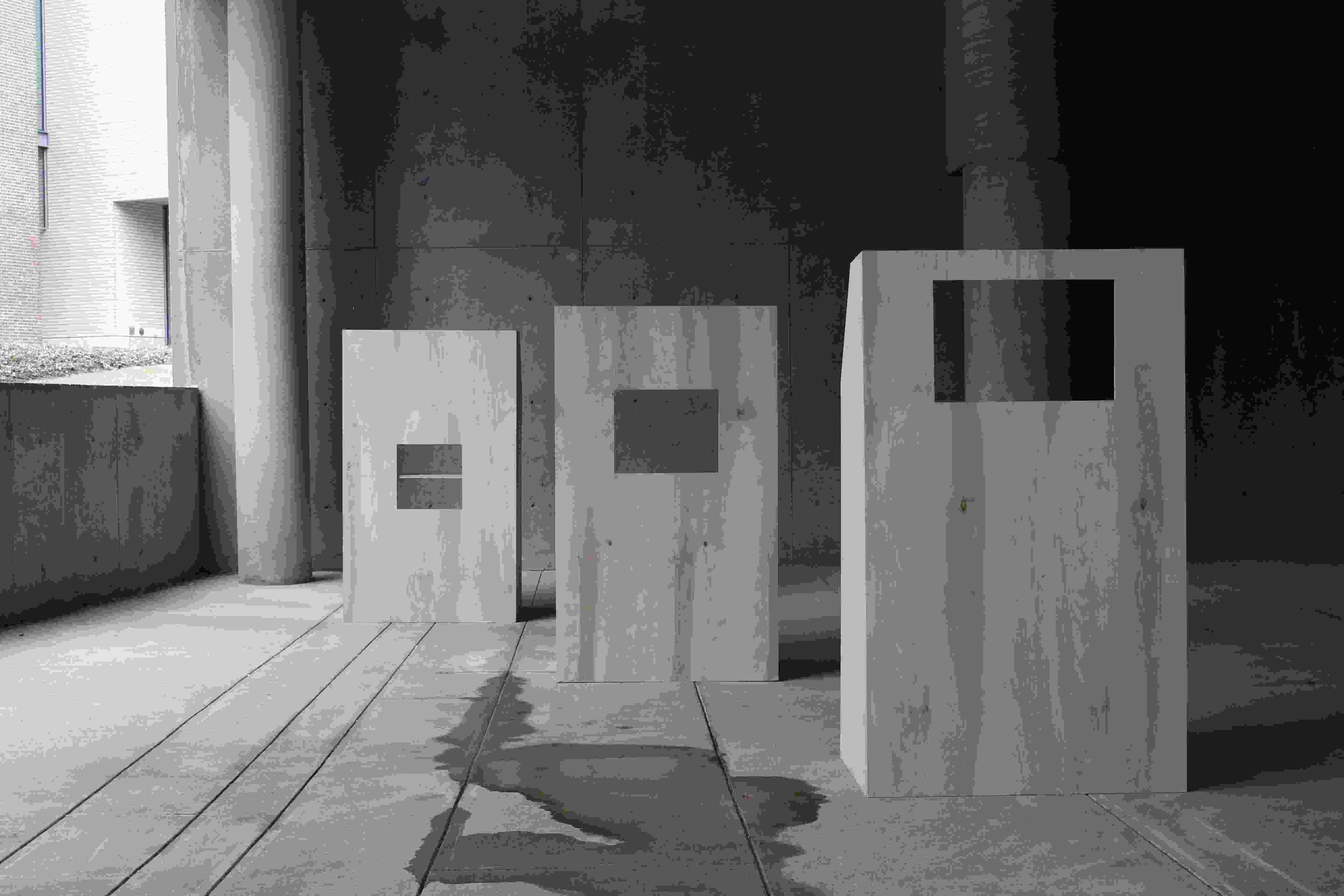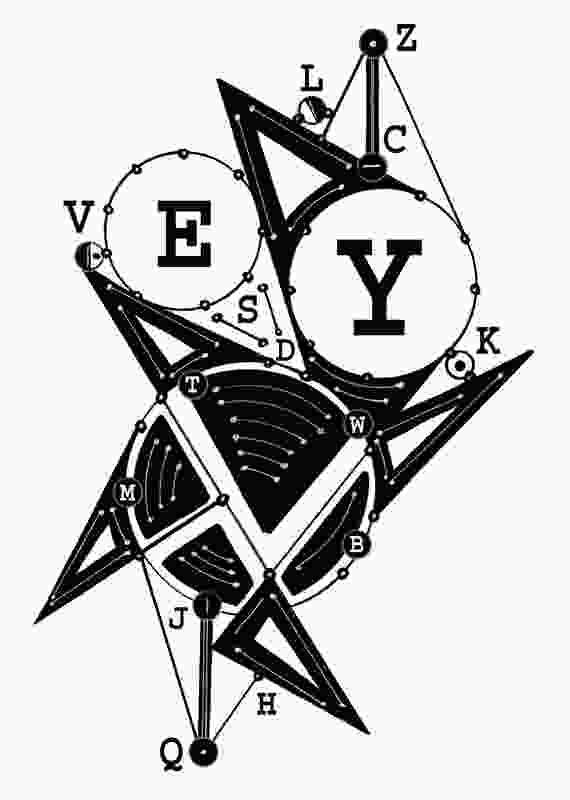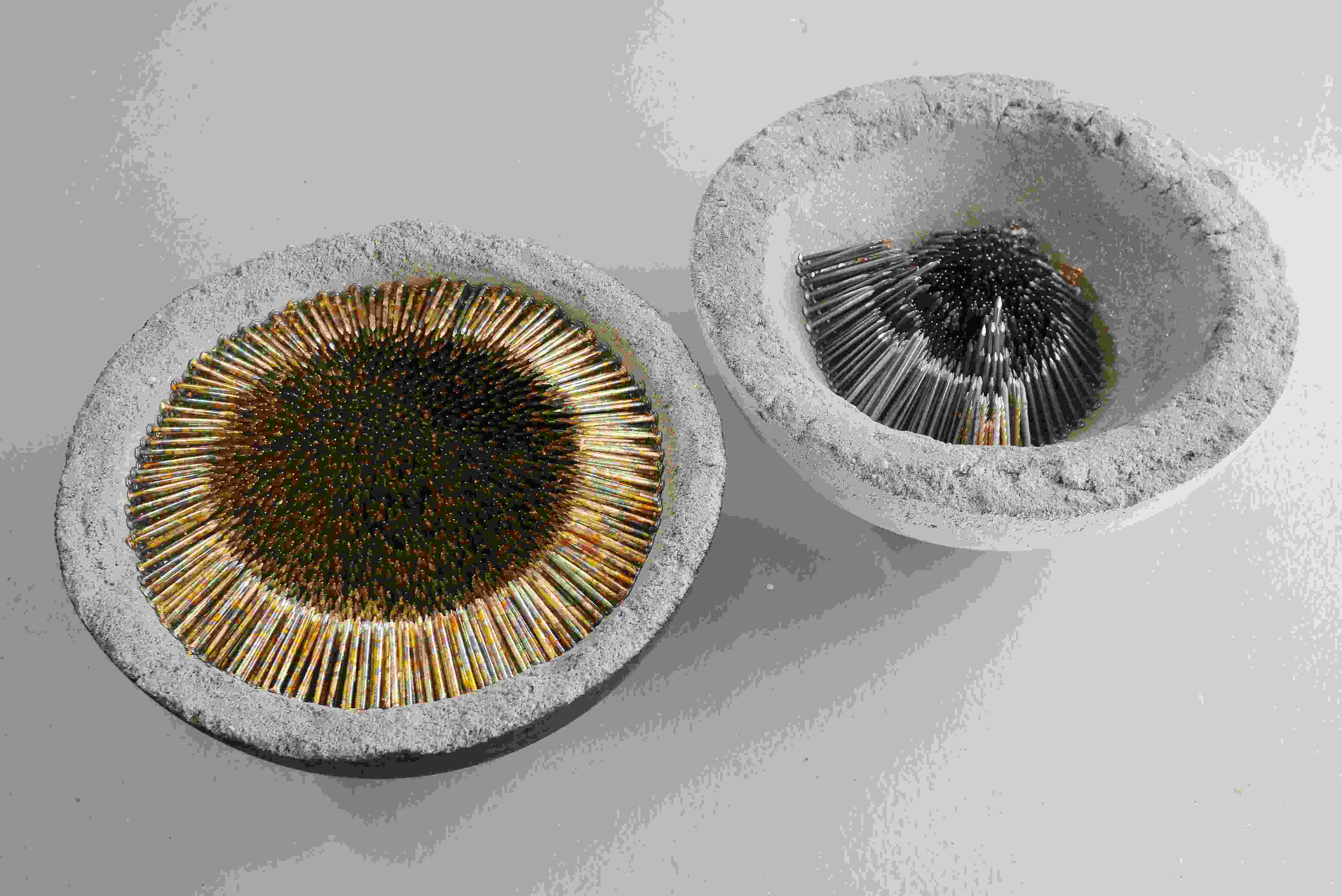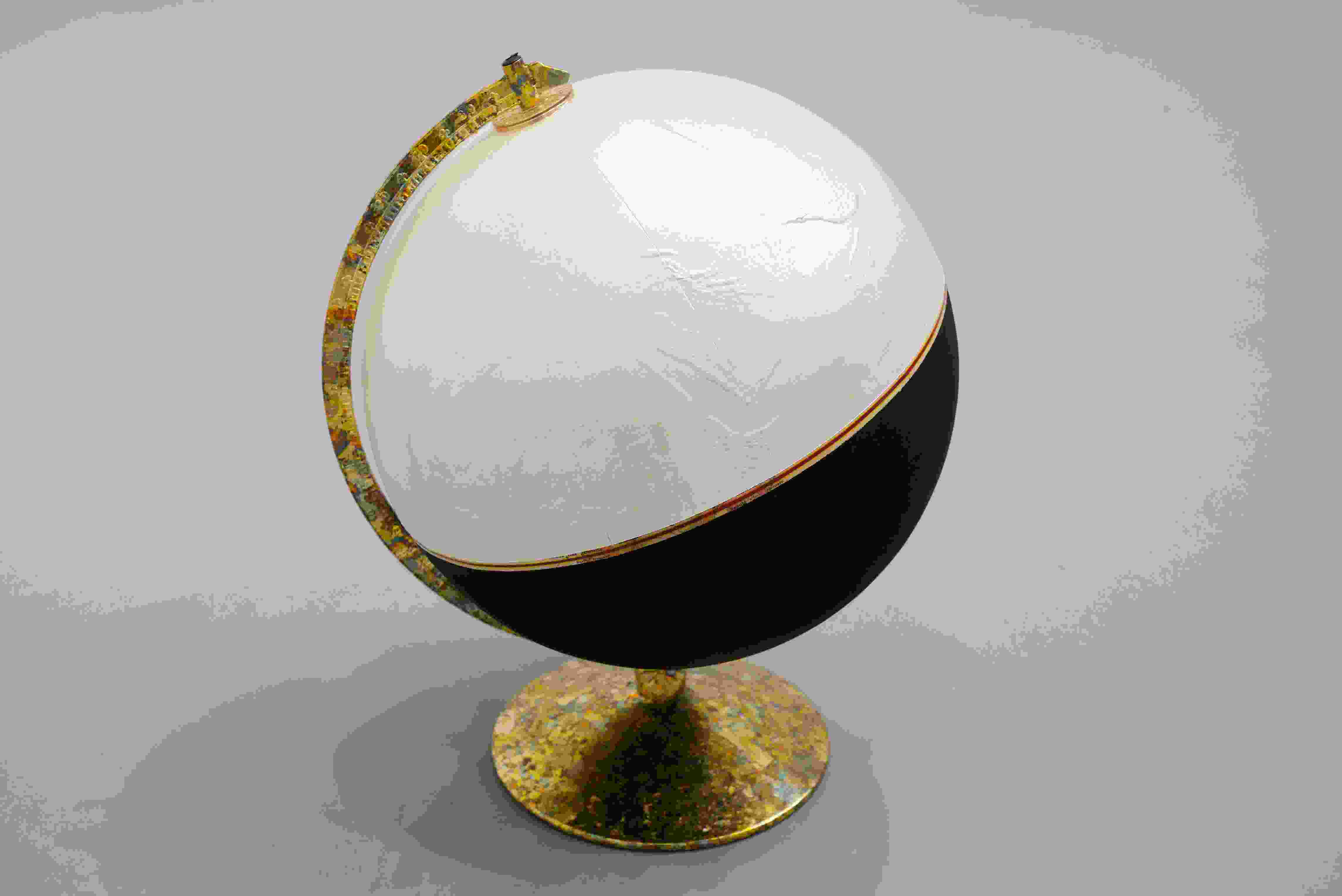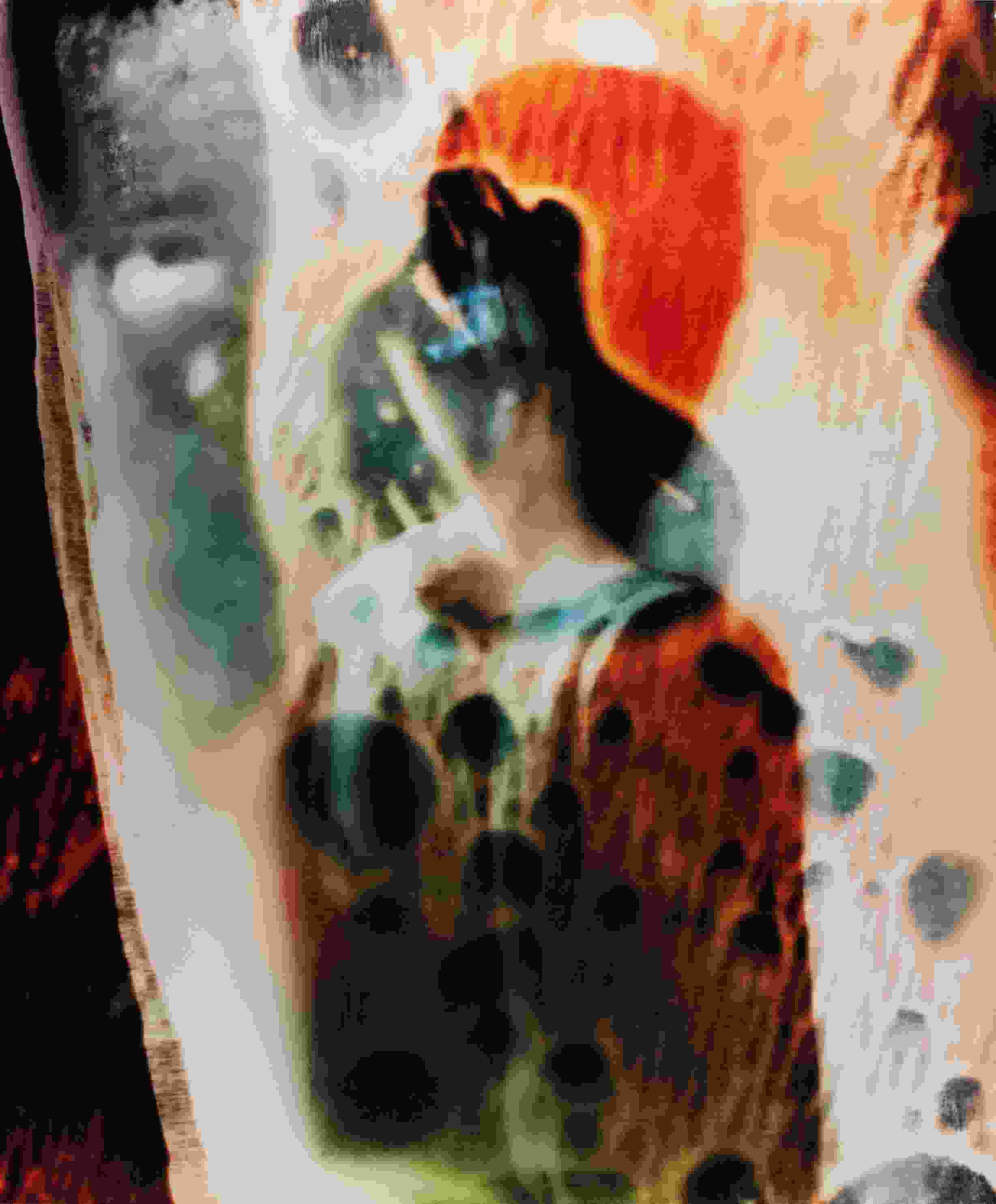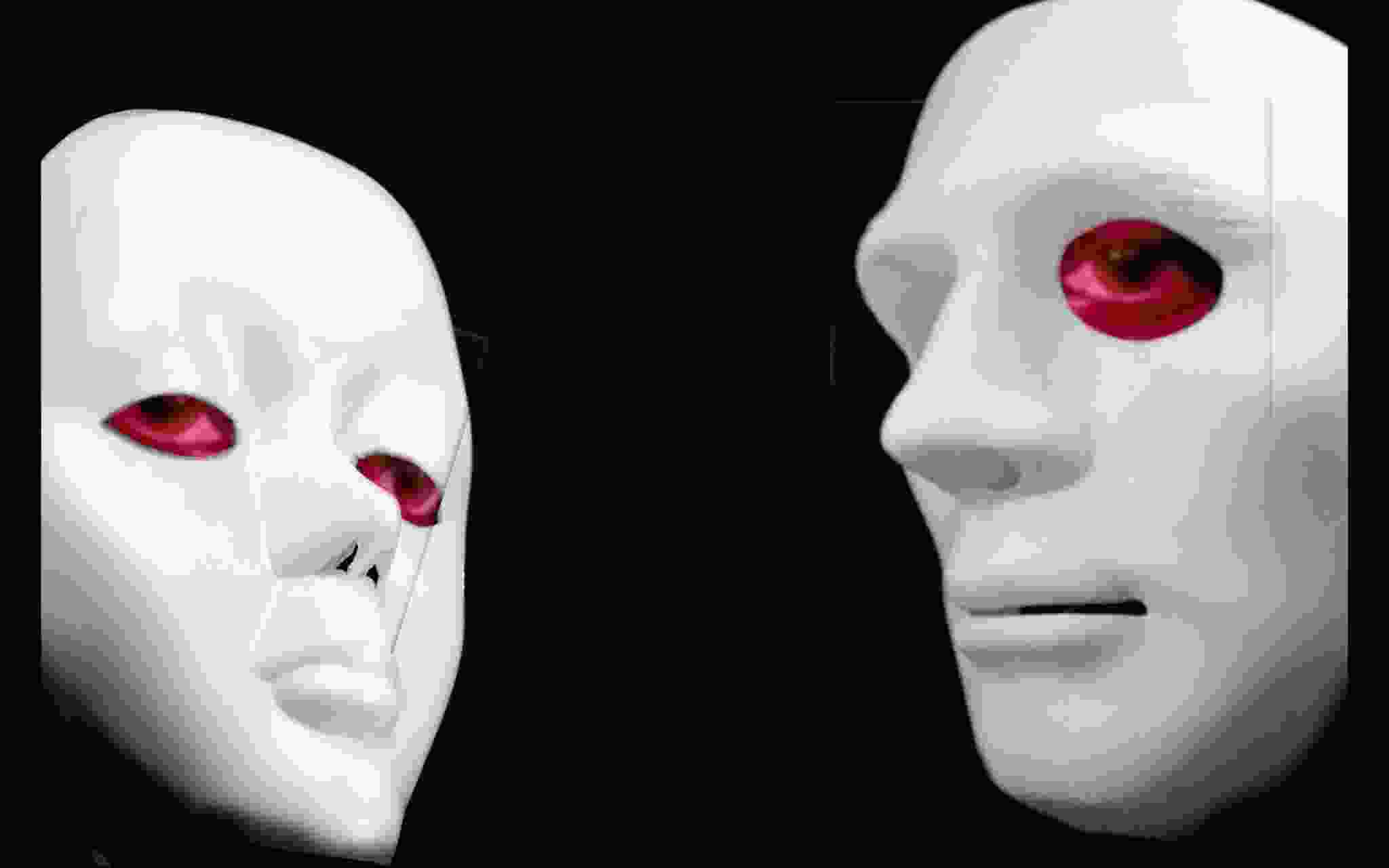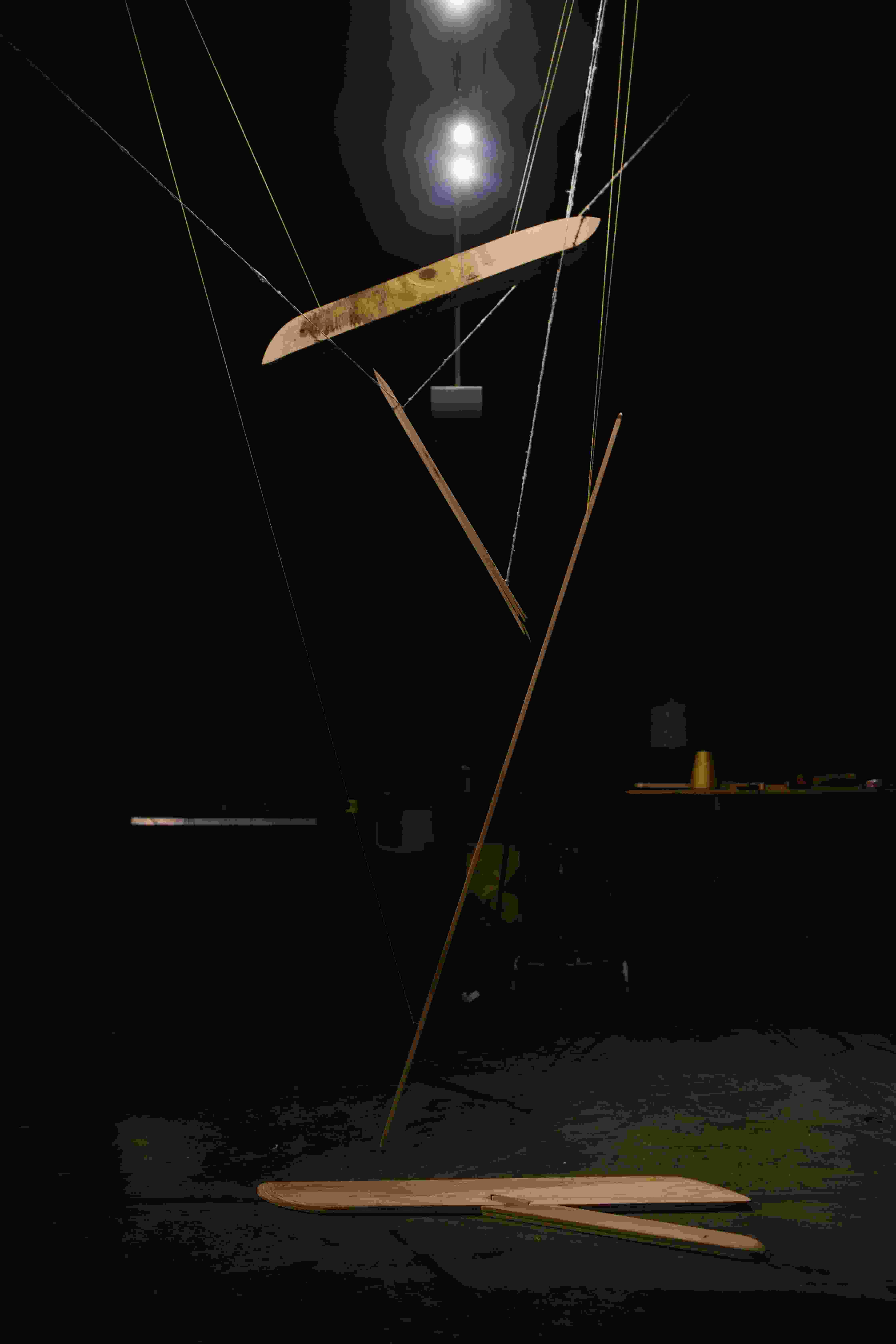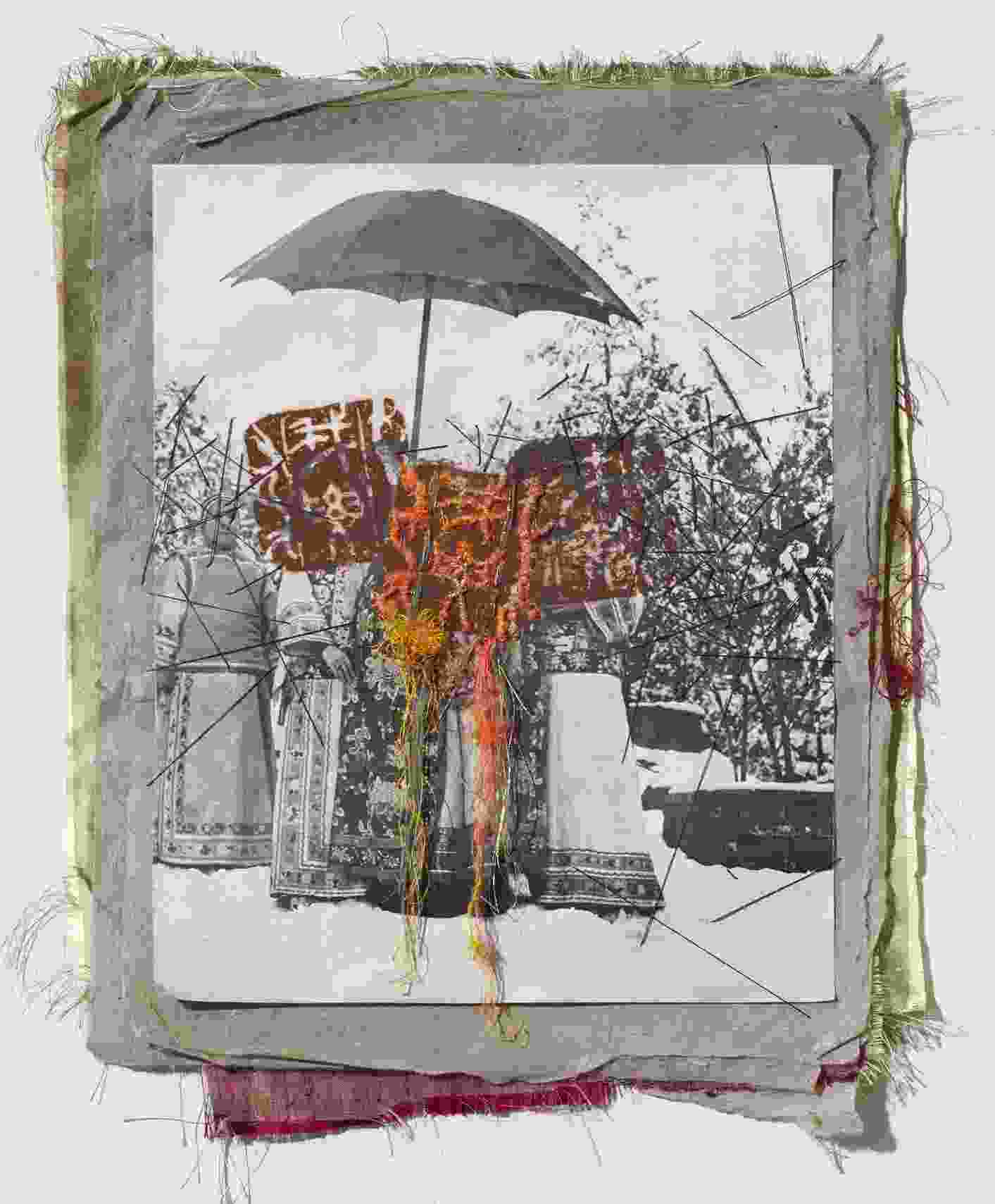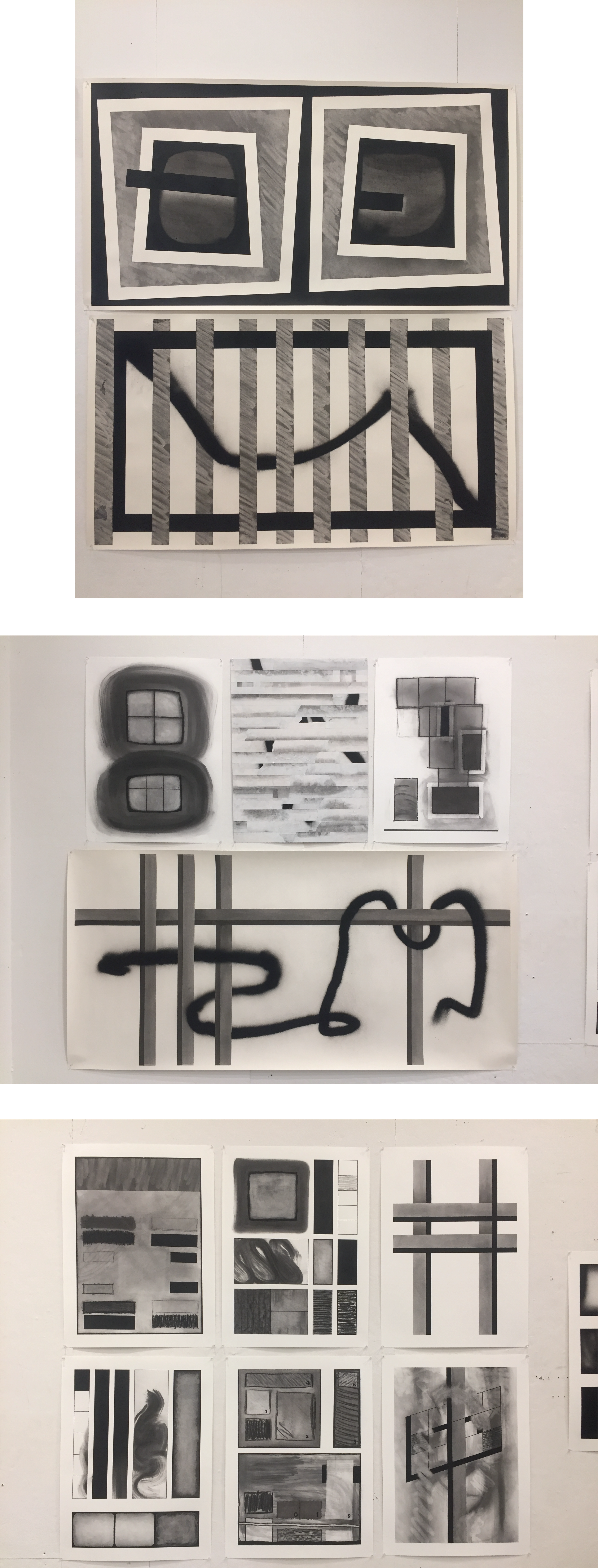Spring 2018 Issue - The Harvard Advocate

Fiction • Spring 2018
One day in June, Dad found a foot in a men’s size 11 Adidas shoe lying out near the salt flats. My first thought was that there must be an ocean around, even though I knew that was impossible, that the salt flats had been there for hundreds and hundreds of years. I’d never even seen the ocean outside of a magazine or sometimes a TV show, and even then I had the feeling that I wasn’t really seeing the ocean, that it wasn’t the same as actually being there. But the foot seemed like the kind of thing that could only wash up on shore from a faraway land, like a message in a glass bottle with a cork as a cap.
Fiction • Spring 2018
My mother can only fall asleep with a hitachi wand tucked between her legs. It is big and white—the thick handle alone is the size of an adult humerus bone, and atop it rests a large bulb the size of an adult’s fist. The bulb is made of a material that is probably plastic but feels like leather, and has myriads of small indentations that collect dirt, fluid—i.e. color, yellow-brown dots that, when the hitachi is turned on to the low setting, make the whole head appear yellow, like a crude pointillism; but on the high setting the opposite effect occurs, somehow the vigorous high speed vibrations, which are so rapid as to be insensible, like strobe lights which give you the impression that a rotating object is actually perfectly still, cause the discolorations to vanish completely, and the bulb is all white, pure white all over, the same color as the handle. My mother, I know, prefers the low setting—but even so I worry that overuse will make her completely numb, which would be a disaster, since it is the only way that she can fall asleep.
Fiction • Spring 2018
While my mother dozed I sat there thinking about Wamblan, which I’d also been thinking about on the commuter train that morning, a jungle river town near the Nicaraguan border with Honduras, and about Jacinto, who thought this mole in the middle of my left hand was a stigmata. Jacinto commanded the small FSLN base in Wamblan, a sort of special forces unit that would head out into the tropical forests and mountains hunting the Contra for weeks at a time. I’d ridden up from the Wiwilí base to Wamblan with a convoy of supply and IFA trucks, and almost as soon as I got there, Jacinto had agreed to let me accompany the troops headed out in pursuit of Contras who’d ambushed another Sandinista patrol in the area, the one true experience of jungle warfare I ever had. Over one night and two days, we chased them, marching in a long single column of troops through often dense jungle, crossing rivers where the currents came up to our chests, so close on the enemy’s trail that we were constantly in danger of falling into an ambush ourselves, and sometimes, when the German shepherd tracking dog leading the column had picked up a scent, or when the scouts up ahead had sent back an alert, we’d slow to a crawl, barely inching forward for hours though the soft green leaves and steamy buggy air. Once we came across a still smoking campfire, a lean-to of freshly hacked branches, we even found a piece of rolling paper tremblingly clinging to a spindly blade of grass, glowing in the sunlight like a tiny snow princess, I remember how Jacinto and some of the other soldiers stood around the piece of rolling paper staring at it as if it might blow us to smithereens, until Jacinto brought his boot down on it and everybody laughed. I saw an emerald toucanet, and imagined myself on a sixth grade morning telling Mrs. Tollander about it and earning my silver star. The Contra escaped into Honduras, deeper into that country than Jacinto wanted to follow, we’d already crossed the border anyway. The night after we got back to Wamblan, I lay in my bunk in the cramped little barracks, covered in insects bites and scratches, feet blistered, my bad knee stiff and swollen, listening to the pulsing electronic-sounding pandemonium of the tree frogs out in that jungle pitch darkness and stillness. Was that really me, lying in that bunk, having made it on my own to a Sandinista special forces base? Yes, that was you Frankie Gee, only a bit more than twenty years ago. And so what. What proof is there that a remembered event is any more meaningful than a fantasy that resembles it?* Prove* it. Prove the lasting value of experience. How is it better than reading about it? In the predawn dark, I was woken by a stirring in the barracks, someone had abruptly come inside, a light was turned on and I saw them, three soldiers, they wore the long beards often sported by Contra fighters and fatigues with the grey-beige-green tiger stripe pattern and pale green floppy hats of Contra uniforms, and I glimpsed haggard faces, one much paler than the other two, with long orange beard. They spoke in low voices to some of the other soldiers, by then the lights had been switched off again, and I heard a low voice say, *The bodies are up on the hill*, and another voice mumbled, though I was less sure of this,* Son nueve, *maybe he’d said,* No mueven* or *No les mueven*. The intruders slept in the barracks with the rest of us, quietly sliding into empty bunks, maybe with their boots and uniforms on. I was exhausted and slept deeply, and when I woke the trio of bearded soldiers dressed as Contras were gone and nobody in that barracks of mostly teenaged draftees said anything about them. Later in the morning a mist lay over the river, and Jacinto, his torso muscular and slender as a male ballet dancer’s, stood in the gleaming green water up to his waist, holding a tiny round mirror up to his face and shaving, while the Cindy Lauper cassette with “Girls Just Wanna Have Fun” I’d donated to the base was blasting from the base’s loudspeaker, I’d given them my DEVO cassette too, the soldiers were happy to have rock music to listen to. I undressed on the riverbank, and, carrying my own bar of soap in a little sandwich bag and a razor, waded into the cool, slow moving river water, so green and rich with jungle minerals. Finally I asked: So those are dead Contra up on that hill? I heard them say there are nine. Jacinto held my gaze for a moment, then barely shook his head no in a way that somehow suggested he really meant yes, maybe it was the way his eyes slightly widened. Do you remember what Jacinto did next, Frankie Gee? How could you ever forget. He held up his left hand, and with his razor touched the back of that hand in the same place where my mole is and held it there, and speaking emphatically if softly, he said: Nuestro Señor watches over you, and I responded: I wish, but it’s not true, Jacinto. That lunatic Sandinista—but a lot of them were religious like that, crazy Catholic Marxists—responded in that same calm tone: No Goliberg, God doesn’t do that by accident, put a mole like a nail head in the same place where the Roman’s nailed the Son to the cross. I was thinking, But didn’t those nails actually go in closer to the wrists? But I also knew that it’s popularly believed that people with stigmata bleed from the middle of their palms. Does this have anything to do with what happened last night? I asked. Sometimes what we call an enigmatic smile in reality is a loud shout, that’s how Jacinto smiled, and he pointed his index finger at me and went: *Ahhhhhh*, voice rising as if he was saying, You’re not going to trick me into talking. Jacinto thought my stigmata and the dead men on the hill were connected. Oh come on, vos, I pleaded, tell me what happened. Jacinto said: We came close to being ambushed the other day, chavalo, they were all around us. We had another column out on patrol on the other side, but I didn’t think they could reach the area in time, but joven Goliberg, they did, so it was the Contra that had to retreat, but not all of them, some followed us back to Wamblan, do you understand? We shouldn’t be here right now, Goliberg, in the river having our bath, and Jacinto gave a little shrug, as if it was obvious. I said: And this has something to do with the soldiers with the beards? They looked like Contras. Jacinto didn’t answer. But obviously they weren’t Contra, I went on, because they came into our barracks. Jacinto visibly laughed, or chuckled, but no sound came out. I said: So there were nine Contra up there on the hill. Plus three more who were ours, said Jacinto, his voice slightly louder than a whisper. Twelve Contra up on the hill, I repeated, and I posed the dumb question: Doing what? Jacinto said: They’d set up their mortars, they had RPGs, and they were about to fuck us, Goliberg. Jacinto held up his left hand again, and again tapped the middle of the back of his hand with his razor. I thought, He thinks Jesus intervened to save us, but then who were those three infiltrators, were they the Divine Swords of Our Lord or something like that? Jacinto had already turned and was wading out of the river and up onto the bank. So there are nine contra lying dead up there, I said to his back. Jacinto held up a hand and tick-tocked his index finger side to side. I looked over the rooftops of the little base, over the whitewashed headquarters built on sturdy stilts, “Uncontrollable Urge” blasting now from the loudspeaker nested beneath the bent eaves of the metal roofing, and up at the steep forested ridge or hill overlooking the town and the river, and up higher into the morning sky that was still a pale gray, where I don't recall seeing vultures still circling over the blood soaked ground where the bodies of the dead Contra had been left by their killers, ground I imagined swarming with ants and maggots and other insects, which made me wince. Probably they’d already been dragged off and buried by soldiers sent up at the crack at dawn, Jacinto must have supervised that operation, then come back down to have his contemplative bath in the river, following whatever trail of thoughts had led him to the conviction that the mole in the back of my hand had some relation to those Three Divine Swords of Our Lord, as if beaming them strength and blessing in their swift deadly work, saving us from a mortar and rocket barrage; three bearded Sandinista soldiers, infiltrators who’d been living at the side of those Contras, marching and fighting with them in the mountains and jungles on both sides of the Nicaraguan and Honduran border for who knows how long; in the Contra camps they would have undergone training by CIA masters in killing and infiltration long after they’d undergone similar training in Cuba, or East Germany, even Lebanon or Angola, their destiny being to finally arrive one night at their moment of ultimate testing on a hilltop overlooking Wamblan. Had they turned into whirling dervishes who slit the throats of their brothers-in-arms in a matter of seconds, snapped their necks with lethal karate blows, or was there was gunfire and we didn’t hear it? Later that afternoon I found out from some of the soldiers that the bearded men had left Wamblan by jeep just before sunrise, headed down to the military base at Wiwilí and back to Managua. To be debriefed by Sandinista intelligence, one impressed young officer told me, he said that probably there’d be secret ceremonies too, honoring their heroism and the success of their mission. “Now they’re going to pull in the net,” he said. He meant that the three bearded infiltrators would have collected information on Contra collaborators throughout that sweep of northern Nicaragua, and when that net was hauled in it was going to full of spies and informers drawn from the rural, mountain and jungle population, and I thought about what that was going to mean for many of them, and for those they left behind. A jungle Cold War spy novel set entirely among peasant farmers, I thought, imagine it written by Juan Rulfo, how cool would that be. I’ll always remember standing in that cool green water up to my waist after Jacinto got out, while Devo blasted out over the river, and looking up at the ridge and thinking about those nine who’d been killed up there, and about the children that at least some of them would have gone on to have if they hadn’t been killed that morning, and about the children those children would have had and so on, an infinitely-branching tree of non-existence climbing into the sky, war’s cosmic orchard. I wondered what the tree of my descendants was destined to be like, how high it was going to rise into the sky, or if this was as high as it was going to get, just me and my shimmery reflection in the river water.
Features • Spring 2018
When I learn about the homeland for the first time, nobody tells me that I should see *home*. A teacher pulls down the map of the world, then the map of the continent, and taps with the black tip of her pointer. “Africa,” she says, and like magic the classroom turns a Sahara-sun yellow, something called tribal print bordering the walls, my sister said, pointing through the doorway; and in a few months she is learning to say jambo, we are beating pellet drums against our legs, she is sent home with a letter to give to our parents asking them to bring African food on World Culture Day. I sit on the floor by the stove, my tongue to the hard scratchy surface of the pellet drum, smoky-tasting, hide-flavored, and worriedly watch my mother make a rice that will be served to our classmates at school in the cafeteria, in huge aluminum pans, in front of the teacher who pulls down maps of the world and its continents, who sent home the letter. (Can your family make us some African food?)
On the day my sister is wearing a shirt, lemon-yellow, Africa-yellow, and on the day I am not wearing a yellow shirt but I cannot let my sister be the only one here, I cannot let these people shit on my mother’s cooking. I hover by the station, armpits damp with anxiety over our classmates who cannot eat the rice because it is too spicy—meaning too peppery—which my mother stubbornly dishes out to them with a smile on her face, sweat on her forehead. Nobody knows what Kenyan food looks like. This jollof is full of bay leaves and scotch bonnet so hot it burned my fingers to separate into pieces and dump into the blender the night before in the suffocating warmth of the kitchen. Today my sister and I eat platefuls like dutiful daughters, the insides of our mouths stinging, cumin seeds caught on our tongues. We watch our classmates spear dodo with their forks and nod when they tell us that they like these bananas (because even then we know that no one else eats plantain). Next to the red station, China, I stare out across the cafeteria, where my mother smiles at me from Kenya and wipes her face with the back of her wrist, where I ask myself what color I feel for the homeland, and then I’m not sure that I’ve ever had an answer.
When I see the homeland in color it is ankara glittering from the inside of a red and blue bag, it is the hand cream my mommy-auntie left on the shelf when she went back to the homeland, peach, rosewater. The grimy glass bottles of Fanta in the back of the African market, in a fridge hidden behind shelves of Nido and cornflakes and halal kilishi and black soap. The dust everybody talked about, settling over their feet like beauty powder. I tell myself know dust, sparkling in the air when light comes through and beams across the living room carpet. I know snow, sparkling in the air when light hits it from all sides. I know the grime I swept up from windowsills with one finger, I don’t know anything about the dust. But the smell of it. And how it gets into your mouth. And the red.
My mother hasn’t spoken about the dust since my father came back from the airport one night, auburn lining his luggage. My father has never spoken about the dust. Instead he told us about the color television in his baba’s bedroom which he and his siblings would secretly watch as children, he described the amount of beer his parents bought him for his high school graduation party before he left for America. The day my father started to remember the homeland more than he had ever remembered it before was the day he began to forget us. Twenty-five years and the Texas in his accent made no difference, when he left sometimes none of us knew if, this time, he would ever be back. Once when my father came back he brought us a suitcase full of toilet paper we were not allowed to touch. Too many curses in the homeland, my mother told us. Too much conflict for this house. I saw the nostalgia dry up inside of her, grow inside of me, and then the homeland became so many colors I couldn’t name them all at once. When I looked at a map of the continent I saw a darkness full of purple lights, bouncing; a house bursting with cousins, spilling out aunties and uncles and music and noise; oil-stained linoleum, reeking of meat roasted to oblivion; green Heineken bottles and the caps we collected and held up to our noses, that bitter lemony smell of the metal; praise medleys and Nollywood voices vibrating into our chests. The homeland became the color blue, a Super Blue Omo blue, of the blankets they piled on top of us during the blackout at mommy-auntie’s house in Ekpoma, and of the milk candy my uncles bought us at a kiosk in the middle of nowhere, and of the painted flowers bordering the china plates my grandmother stacked with biscuits and agege bread. I picked sugar crystals off the tops and ate garri with powdered milk and even though I knew the nostalgia had died within my mother, who was only here in Benin City to bury her iye, I would put my fingers to my mouth and taste sand. Sugar. But somehow from the window, from the playground in front of Mr. Bigg’s, in the hallways of the hospital where they brought my sister to take a shot of antimalarial, I could still hear the mourning. The sound of the shovel, dirt over an ancestor, someone disappeared into somewhere: someone finally returned to the sea. I wipe the tears off grown-up cheeks with my hands, my knuckles, and imagine ancestral spirits among the waves, bobbing like lights towards an unknown endlessness.
I hear the homeland like it’s trying to reach out through the speakers at a backyard wedding party and touch me, slip into my skin, nestle into my stomach. Somebody from the soil once said, “The place of remembrance.” Somebody newer said, “The center of love.” When, shaded in orange from a faraway streetlight, my cousins and I sit on an uncle’s front porch holding bottles of malta against our bottom lips and swaying reluctantly to P Square the summer of “1er Gaou”, I can maybe imagine that the stories are not so far away. That the language lives between my teeth, silently, tucked into the left sides of my cheek like baba dudu waiting to slip, to be swallowed whole. That when the time comes to speak, it filters out into the air like the red dust of the homeland. Its perfume. But our aunties say, “Sweet, like chalk,” and I do not know what on earth that means—*chalk? A sweetness?*—I think of a loss in translation, I think despair, I think of the sand, mixing in with the sugar. What I know how to translate is thank you. Good morning. I’ll see you later. I pronounced my name and all the aunties and uncles laughed at me. Then saddened for me. They said, “The name. What we gave to you from the homeland, the only thing we thought you could keep.”
When I speak homeland I speak something else. My parents call me baby-baby and sweetie pie, they kiss my forehead with lips pursed into an English *Honey I love you*, our language of intimacy. Their language of love. Even when they are very angry they are angry in English. I asked them, “How many times do you dream in homeland?” (But I cannot remember what on earth they had answered). When my parents speak homeland together it is their language of secrecy, and when my sister and I sit on the stairs trying to listen for our names in their dense conversations it almost feels like a constant defeat. Africa, a traitor. When I speak homeland it means I’m speaking English, which is not “my native language”, which cannot be; although it is the only thing I really speak, it is the language my mother used to sing to me at night as a baby, it is there when I love somebody, when I can’t find the words, when all I have between my teeth and inside of my stomach are shooting stars and feeling. I call my mother and ask her about her day, and the language comes out like gravel. She does not like the America in my accent, the softness of the syllables, the mismatched tones; she says, in English, “Just speak English. ”
I think that maybe she found English a liberation. She cannot speak homeland without bringing it to life with English. She was younger than I am when she arrived at LaGuardia, Jheri-curled hair and a suitcase full of Austen and Shakespeare, she could not tell you who the current president of Nigeria is—and so we can almost forget that there’s something missing. We throw *I love you*s out into the world like confetti. There is no word for love in homeland. Still I kept notebooks full of words, wahala and mumu and na wa o, and when I wanted to learn something beyond the heartbeat of the nation she said, “No, you are from the *heartbeat of the nation**.*” When I tried to learn homeland she said, “Stop, stop speaking.” I wrote down more words. She couldn’t understand them.
The homeland on paper is silent. Too small now. Too gone. I am obsessed with the ruins, I read all the stories about the kingdom and realize many of them end in a bloodshed that makes the baba dudu taste sour in my mouth. Yet relentlessly I search for art history papers about religious ceremonies and chalk thrown into rivers; I put together documents about spirituality and title them mysticism. I look at the shirts my sister and I were made to wear as children, photos of stolen artwork printed on the front and underneath, a caption urging the British to bring our iyoba home. Realize so much has been stolen that my foreign hands are never enough to salvage, no matter how bare, or determined. When I learn about the homeland my professor turns on the projector to flash us an image of the continent and then switches the slide to an overview of South Africa. One tribal system is Africa’s system. One people’s religion is African religion. We sit in lecture romanticizing Africa, they tell us, “Let’s think of a new Africa,” erase the old Africa—first the Kenya-yellow Africa, then the homeland of bouncing purple lights. “Let’s invest in Africa,” because Africa should be our next real-life endeavor, Africa has all this real-world potential, Africa just needs somebody to believe in it. They say everything I have is not my own, not my liberation love-language English, not my grandfather’s Catholic church, not my grandmother’s European name. They say everything I have is adulteration. My family does not care when I call after class to describe all the Wole Soyinka I have studied. All they know about the history of the homeland is that it was a very large and very ancient kingdom, and for this reason my sister and I were named very ancient things. The first woman born to the world was Adesuwa. The second, our namesake. My mind dreams her up in a deep red wrapper, shining, coral beads clinking together around her neck and ankles. Black hair gathered into a crown. My mind dreams up a woman from the homeland and I do not think she looks like me. My aunties, wrapping fufu in aluminum foil, sometimes stare as one of us passes through the doorway, lamenting our faces (features full of America). How much America has drawn homeland out of their children. How they cannot give us a single piece of our ancestors, no matter how hard they try. But instead bequeathed a nostalgia so heavy it is all of the old country weighing us down. We say we would like to someday visit the homeland; they ask us what we think we are trying to find.
They do not know that when we are not learning about the homeland, the homeland does not exist. There are no black children in America whose parents got off planes here in 1984 or 1991. The grandmothers I venerate were Freedom Riders, were women who lit the lamps along the underground railroad, grandmothers who did not know I would come but did all these things so that I could come. Their blackness is the only blackness that holds me in its arms and makes me feel like a daughter. The homeland is a birthplace I romanticize through their eyes. When I learn about black people for the first time I remember my teacher in that empty classroom, sunlight filtering through the window and illuminating the colors on each shiny page of the book, Ruby Bridges lit up like royalty. My teacher followed my eyes, wanting me to read the words and breathe in the story, the courage! The revolutionary! But I kept looking down at the illustration of her, Ruby Bridges in a pink dress, six years old and brown like me, I wanted her curls and her white socks and her cardigan. Wanted the baubles tying up her hair. At home I have big flat picture books about Sojourner Truth and John Henry but my grandmother is a woman I speak to once every seven years. My grandmothers are all dead. The last time the homeland buried an iye I was not four years old eating garri out of a ceramic bowl, sitting on the window seat and trying to hear the bright music of church bells piercing through the gray gray sky. The last time, I was facing my house, in the middle of the road, another place I’d started calling home. That last time, I cried. A loss so vast it was all of those souls, lights drifting through the ocean, tired of waiting for me to find them.
When I dream of the homeland I dream mythology. Everything I have is not my own. How many times have I learned about the homeland and hoped I could feel some kind of connection or some kind of beauty in a history no one records anymore? Do I still press my palms against the glass at the Met and close my eyes in front of the ivories, wishing some kind of forebear magic would filter in and fuse with my very Western soul? I had a mommy-auntie who would carry me on her back until I fell asleep on her shoulder and feed me beans with the tips of her fingers, who would press her cheek against my forehead when I was sick and sweating in her arms and once walked a mile in the snow to buy medicine for my fever.
“What’s the matter?” my mother would ask me when I was very little, and my mommy-auntie would explain, “She doesn’t like crowds.” Or, “The TV’s too loud.” Or, “She only drinks chocolate Nesquik, you’ve bought her strawberry.”
Sometimes we’d go out to feed bread to the birds after it rained, and then she would poke my stomach and ask me questions in homeland. (Sometimes I answered correctly and when this happened she would take both my hands and shake them, overjoyed). When she went back everyone says I sat by the front door and cried for weeks. When I speak to her on the phone now she cannot understand me. Eventually someone explains that mommy-auntie isn’t used to my accent anymore, the American noise of my words so thick and heavy that she never calls to speak to me again. But there was a time I dreamed of her when I dreamed of the homeland, I conjured her smell when other people’s planes landed in from West Africa at JFK, I slept with her scarf around my neck and listened to people talk to her on the phone and wished she would ask to speak to me again. So that maybe I could just try again.
When I learn about the homeland I draw a map in my head that looks like an expanse of silk-linked constellations. Trails of lights intersecting across the sea, a warm clear water and something returned. A map that sounds like highlife guitar, collecting dollar bills on a shoe-scuffed dance floor, Asa above the sizzling of onions, like cymbals edited into her rustic strumming as my friend’s mother cooks a golden shito behind us. A map that has all the wrinkles of fabric crumpled up at the back of my clothes drawer, glitter from the gele still rigid with pins, sequins from the skirt our grandmother sent us from a tailor in Ibadan. Iye-nokhua, drinking her morning milk and tea and eating her buttered bread at the table, then an apparition of woman towering over me while I squinted at the crystals on the biscuits, the flowers on the plates. Later an illumination of a buoy shifting towards the final star, the homeland, the center of the world. The two-piece she sent was green-black-orange, and when I tried to put it on I realized I couldn’t sit, couldn’t move, couldn’t breathe in it. Instead put it to my nose and inhaled deep the Africa. Was this, I wondered, a thing I felt I knew by heart? (“No,” my parents would later say. “No, you don’t know Nigeria.”)
Still, how it smelled like my father when he comes back from the homeland, sad to return to remembering us again, jetlagged and sentimental for days—how it felt like falling asleep as a five-year old with my pinkies stuck in the lace of his white-lavender agbada. The time he would look at me like he was looking at *me*, instead of something stopping him from making that final trip back home. One day when my sister and I were small he told us that there is truly not much homeland in us but just look through the window—we were in the car, I rolled down the glass and put my hand out towards the traffic—just look through the window, this place should be home. So maybe every day I do the remembering. And maybe every time we’re a little more found.
Poetry • Spring 2018
Was it noble,
The bitter austerity of desire
Opposing
Viol to cello, rampant to redoubled
Free animals,
Phaedrus a litter of souls coupled
Eternally?
There was a hillside farm, a steep one. I saw it.
It was slow to
Perish, floating in a mist of white bees.
Then later,
My face became strange to me.
The world also.
Charioteer of wounds and bleeding,
What herbs might help
My dead beneath the bright wheels of thousands
Of you? Wild thyme
Was a man once. The upshot and noon inclined
To apogee,
The higher still as early Magdalene.
Poetry • Spring 2018
1
It was like
palm trees in a line
outside the building
I catch my sight
by: I get it
and it goes. Girl
overtakes me
in her leopard coat.
Angora guy
sweeps up his zone.
A river
slides behind
the palms, and the sound.
I tune it all out
too, each getting
a rush in. I get
the feeling grows.
2
I take
my pill daily,
and the days go by
a curb. I leave
to cross,
now, to turn
the one-way.
Not memory:
I wear the jacket
new, hand-painted
blue. All over
it was like:
always meet
your next in fuss
-free pomade.
Few wear gloves
in warm winter.
3
He swayed
as if he had me
with his traps.
It was just down
to his face.
When I inhaled
the air of him
I felt as if
I’d only know.
He was sweet
when he talked.
His mouth closed up.
Orange pullover
and a cling job.
I came away,
not even changed
by the ripeness of his lips.
4
In that office
I saw a plant
so green it was like:
I insist. Being
nowhere else
became its own
effect. I lacked
Poetry • Spring 2018
To my amazement, someone is dancing.
Eternal Biedermeier, the sound of windshield wipers
Lulling the car, making of the rain
A beloved shape-shift deeply, my sister’s
Charm bracelet on the wheel rhyming “Ramapo”
With “Brahms’ Alto”, the sound is stronger than hills
Yielding to facts. This is my poem,
A paean to dementia. This embraces
Dementia. The rain conceals a little,
Then is wiped away. The next exit
Toys with the undercarriage gently.
Rain makes a gorgeous pattern on the glass.
Let us begin: we are driving in the rain.
Rampant, redoubled, sister and I see
The rain so beautiful and then an empty
Windshield equally deathless, dazzling
Winter bees with a mountain on each wing.
By noon, nothing remains but romantic litter.
Biedermeier at all the outposts beats,
Whirrs, thuds. One charm upon her bracelet
Rings my eye with emerald around.
The first word of the risen Christ was “Woman”.
Did Magdalene require a further word?
Is there a forgotten country, *un pays vague,*
Behind the vexed and uxorious country
Forgotten just now? Litter of rain,
Little winter birds suggest as much. The aftermath
Of Bellerophon was olive groves. But see:
The shadows of olive trees turn instantly
To water. Waves of light, in a concourse
Of silver hyphens, drench new patterns of herbs
Near to home. Home is a southern studio.
Mother dotes upon the downing moon.
My sister drives a Biedermeier toy.
To my amazement, someone is dancing.
Poetry • Spring 2018
1
Agreed. I sat in a house nearby this railroad. A place with two rooms I remember owning. I was cornered there a long time. Hunched over. Fishing in that stove for scraps I hid. Reminds me of
eating. Or rather telling time. Not the stains or that purling in my gut, but the slow blood heavy in my fingertips, lingering underneath, those bloodbanks ready for hulling, as if they
space, as wide as
a ruined barn
that’s rented, battered or like a raw deal at ten o’clock in the morning, that’s repairing then chafing itself, each time dawn breaks, rasping. I hear it.
2
In that city, back in the far field of railroad yards, I turned up. Out of the inflamed river and burrowed into the bank’s slop. It was revealed what my sodden wallet held: some nickels
I imagined gently being painted, my face on each one. There were times before now.
again. The water is deserted
by its river.
Editor's Notes • Spring 2018
Spring at the Advocate is a time for leaving.
School wanes, days get hotter. People trickle
out of Cambridge in ones and twos and then all
at once. Cardboard boxes pile up on the sides
of streets, lled with the expendable matter of
college life: textbooks and miniature trash bins,
cheap desk lamps and plastic shelves. Students
haul them into basements, stack them up in
identical rows, and let them sit for a while, as
they coat with dust and suffuse with the smell
of peat. Then, at a certain point in May, casual
goodbyes gain weight. As our friends say good-
bye for the last time in a while, “see you soon,”
we respond, not knowing if we will.
We’ve always found it uncanny and sad
that a mass of people can disperse so seamlessly,
like fog in sunlight. Your social life warps and
shrinks as the people you run into every day
become elsewhere. But the Spring issue comes
to you from this nonspace; our writers and art-
ists bring you with them as they go home, here,
and away. Fittingly, these pages present visions
of worlds in constant transit: mighty kingdoms
dissipate into playgrounds, geological history is
reverse-engineered, empress dowagers are wiped
from the record-books, and the distant past grows
tentacles to come knocking on our collective
front doors.
Open it up and let it take you there.
Archived Notes • Spring 2018
Three years after the Supreme Court declared corporations are people too, a 44-year-old sometimes entrepreneur named Mike Merrill is trying to prove the opposite. Merrill became the world’s first “publicly traded person” in 2008, when he created 100,000 shares of himself and sold them to friends and strangers at $1/share through a website called KMikeyM. On Mike’s website, you can purchase shares in “him,” which entitle you to the same number of votes on Mike’s day-to-day and life decisions, such as whether or not to grow a beard, register as a Republican, get a vasectomy, or date somebody. Every couple of weeks, Mike posts life updates and new decisions for his investors to vote on. I purchased 5 shares in Mike at $5.10 each; given recent, dramatic developments in his life, I think I got a good deal.
When Mike took himself public at $1/share in 2008, his implied valuation was $100,000, which is significantly lower than the FDA’s figure for the value of a human life: $7.9 million. Today, his shares are worth about $6 a piece, implying that Mike’s enterprise value has appreciated to well over half a million dollars.
After purchasing my shares, I took a look through KMikeyM’s trading history and observed some interesting patterns. On June 14, 2012, he was worth $20 a share. Six months later, he was going for 99 cents. I expanded the date range; there were fluctuations all over the place, cycles of booms and busts. An entire human drama, captured in a craggy chart that looked a lot like a heart monitor.
In some respects, I suppose the chart was not unlike a heart monitor. The trading price logged Mike’s investors’ financial and personal interest in continuing to participate in his life. I compared the trading pattern to his intermittent journals and discovered that the share price was typically unresponsive to mundane, run-of-the-mill decisions such as “Should I grow a beard?” or “Should I invest in a new wardrobe?” Looking at the journals that corresponded to the handful of big booms made it clear what the shareholders were really interested in: Mike’s sex life. In April of 2012, after lagging at around $8 a share for more than two years, KMikeyM posted a new proposal called “Shareholder Control of Romantic Relationships”—which was exactly what it sounds like. “Under normal circumstances, no one is going to complain when someone is buying flowers or going out to dinner and a movie. But as a publicly traded person with a responsibility of productivity to the shareholders, we live under special circumstances,” Mike wrote in an ungainly majestic plural. “It's been about 10 months since our romantic break-up with [Shareholder No. 7](http://kmikeym.com/users/7) and it seems prudent to set up the conditions under which we might enter future romantic relationships.”
The price shot up to $20 in 2 months. Somewhere along the line, Mike began dating a woman named Marijke; a quick scan of her user profile revealed that she had been one of his early investors, having bought 50 shares in August of 2012. One post from January 7, 2015, entitled “Romance Contract Revisions,” hinted at the strain that radical shareholder accountability had placed onto their relationship: “K. Mike Merrill and Marijke have been in a shareholder approved relationship for more than two years and the contracts have evolved,” the proposal read. “The major effect of these revisions is less specific mandates balanced with regular accountability.” The prospect of “less specific mandates” infuriated shareholders, many of whom were particularly appalled by one particular clause (5.2) that would allow Mike and Marijike to get married without putting the matter to a vote. “Should approval of this revision also be considered pre-approval for the parties to pursue procreation if they so wish?” wrote one shareholder, egli, who voted “no.”
Mike and Marijike broke up last month. The announcement came in a post called “Mutual Release and Non-Disparagement Agreement,” in which Mike implores his shareholders to buy Marijike out: “We both believe that it’s emotionally and fiscally responsible for her to liquidate her shares.” His shareholders were only too glad to oblige (the vote passed 5,509-65) and gobbled up Mike’s ex-girlfriend’s shares at a modest, price-controlled discount. And so a five-and-a-half year long relationship came to an end, with the ratification of the following clause: “Girlfriend hereby ends the contractual romantic relationship and any positions held or once held in relation to the Project and any Affiliate Projects including, without limitation, erotic fanfiction, working groups, hot sauce ambassadorships, snack-based media websites, film, video, or books projects, and any other projects effective as of the Effective Date.”
With my five shares, I voted “yes” on the “Mutual Release and Non-Disparagement Agreement,” an exhilarating experience made more so by the fact that I had actually paid around $25, in real money, to have a say in the matter. After I clicked “yes,” I was suddenly reminded of Julian Jaynes’s 1976 book *The Origins of Consciousness in Breakdown of the Bicameral Mind*. The ancient Greeks, Jaynes claimed, were not “conscious” in the way that we would consider ourselves to be conscious today; rather, they understood their thoughts as the direct voices of the gods and simply obeyed them. I believe this imaginative and somewhat fanciful theory contains the crux of KMikeyM’s unsettling appeal. One condition of living in late capitalism is the recognition and frustration of being alienated from capital and the owners of it, which shape our lives, decisions, and identities in invisible and godlike ways. For Mike’s shareholders, the allure of KMikeyM lies in the experience of transporting themselves to the other side of this mysterious mechanism, even if on the scale of just one individual. And for this to be possible it is essential to imagine an unconscious, unquestioning Mike Merrill. That would explain the hysterically self-serious language on the discussion boards, which serves to sustain the illusion. One user who calls himself abodens3 wrote, “My thoughts are about Section 5.2. If the couple has the option to become a legally recognized relationship (engaged to be married) it would assimilate to a public-traded persons' merger.” It’s serious business indeed--the users of KMikeyM do not hesitate to put their money where their mouths are. abodens3 has a portfolio of KMikeyM shares worth over $450. Another user called aaronpk has put more than $8,000 into the project. I hope, for Mike’s sake, that he’s at least an acquaintance.
After a while, a few considerations about the imperfections of the project began to nag at me. KMikeyM’s motto is “community through capitalism,” which sounds like the slogan of a nightmarish neoliberal dystopia sprung from the imagination of Ayn Rand. The naïve ethic is appealing in its own way: privatize everything! Privatize even what is most private; the wisdom of the market will optimize everything and elevate Mike Merrill to ubermensch status through rigorous shareholder input. The problem was, Mike’s shares didn’t appreciate when the “underlying asset” itself became abstractly more valuable—through professional or personal success. They appreciated when the game became more interesting. Voting wasn’t part of the game; it was the whole game. Mike’s “investors” had little interest in his hobbies or budding entrepreneurial career; what they were after was the thrill of ownership and of living vicariously through him.
I wondered, then, whether Mike could have improved the design of the project to increase its realism. Say he had structured his stock so that each share paid “dividends” that entitled you to a percentage of his annual income. That would certainly incentivize his investors to take his professional pursuits more seriously. But then the shares would have to be more expensive, and the shareholders might demand additional rights—for instance, the right to submit their own, original proposals for the co-owners of Mike Merrill to vote on, opening a Pandora’s box of moral hazard. I shuddered at what an anonymous online community of 800 “shareholders” could come up with. It was just a matter of time before someone suggested a tattoo, and perhaps other activities far more extreme: sell your house and move to Phuket, run with the bulls in Spain, climb Mount Everest. If the game became too enticing, what would stop someone with cash to burn from staging a hostile takeover—purchasing all of the shares at a premium to seize total control over Mike’s life?
I thought it was far-fetched until I came across a vote from January of 2012, in which Mike proposed that in the event of his death, the benefits from his $100,000 life insurance policy should be distributed amongst his shareholders. The vote passed 297-10.
In 1974, the performance artist Marina Abramovic sat in a gallery in Belgrade, Serbia for six hours with 72 objects in front of her and told the audience to use them on her however they desired: “I am the object / During this period I take full responsibility.” The objects included a rose, a feather, olive oil, scissors, and a loaded gun. One participant cut her throat and started to suck her blood. Another put the gun to her head.
I often wondered who the people in Belgrade were, what they were like. I also wondered what the shareholders of KMikeyM were like, how it would feel to meet one of them face-to-face. Earlier this past week, I sold my shares in KMikeyM at $6.15 a piece—in sum, I made about five dollars.

